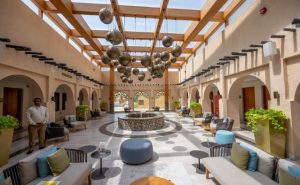The Qatar hotel where the England team will stay for the World Cup finals this year faces criticism in a report for failing to pay wages of migrant workers in low-paid jobs, and sacking staff with little warning or severance pay when the Covid epidemic began two years ago.
The five-star Souq Al-Wakra hotel in Doha which will host Gareth Southgate and his players is alleged to have failed to pay overtime and, in some cases, discriminated on the grounds of nationality when considering promotions.
The hotel, owned by the Tivoli Hotels and Resorts Group, is one of 17 official Fifa hotels investigated by Equidem, a human rights and labour rights charity, who were able to conduct confidential interviews about working conditions.
Speaking on the basis of anonymity, an Indian worker who worked as a chef at the Souq Al-Wakra said they had lost their job at the start of the Covid pandemic and had not been given any severance pay.
They said: “During the pandemic they [the Al-Wakra hotel] fired many staff. They told us that ‘Within one month we are going to fire you’. They paid our tickets to our home countries and gave workers they fired 400 Qatari Rials [£91] to pay for food until their flight. They did not provide any other payments.”
An Indian worker told the investigators that they had been overlooked for a promotion. They said: “Here, they give preference to Arabic speakers when it comes to promotion.”
The report discovered that migrant workers across 13 of the 17 Qatar hotels officially approved by Fifa for the World Cup finals later this year, face a variety of serious labour abuses including 12-hour days, no overtime pay, and the prospect of losing their jobs at any moment.
The investigators interviewed 69 migrant workers in Qatar, including 40 across 13 Fifa partner hotels, and discovered that over-work, wage discrimination based on nationality, inadequate protection from Covid and job insecurity were rampant despite so-called reforms.
Souq Al-Wakra workers reported in some cases that overtime was not being paid. One worker told investigators: “Other hotels were paying. They [Al-Wakra] don’t hire enough staff, so we need to extend our time working. Overtime is not paid there [at Al-Wakra]. If we extend our working time, they should pay for it.”

